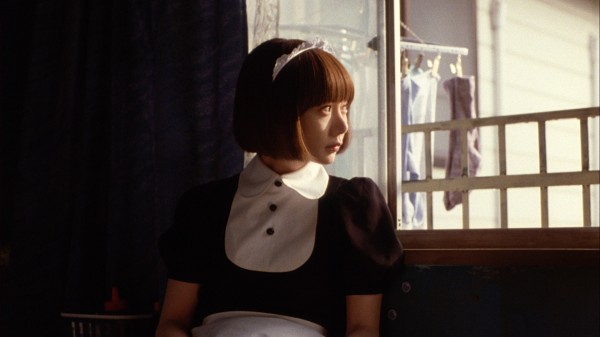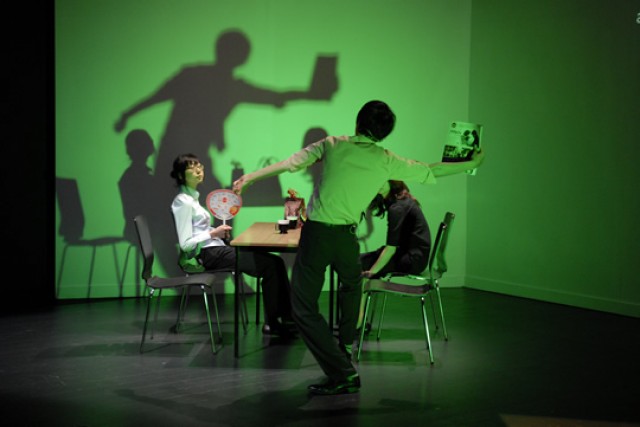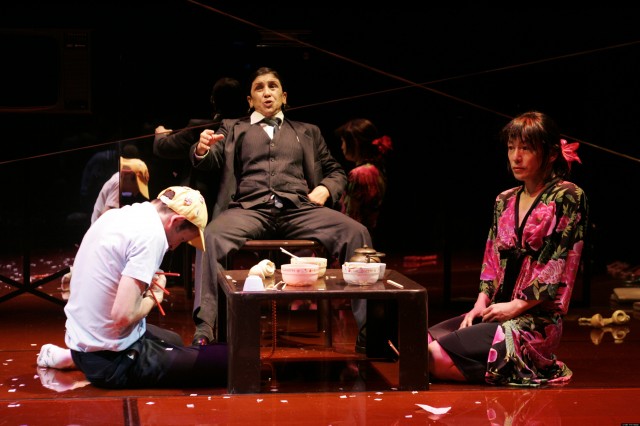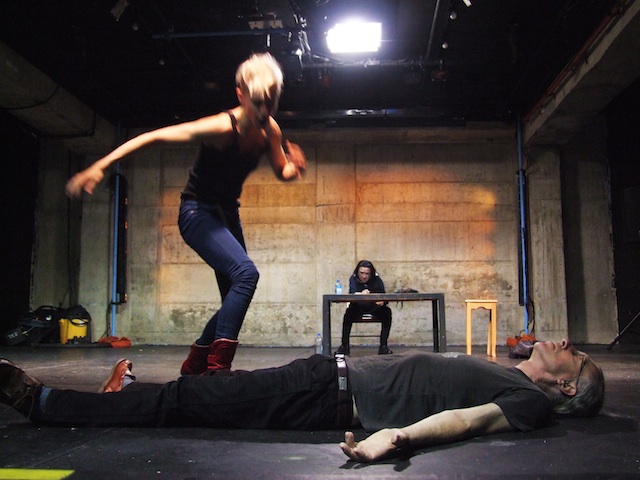VEGETARIAN (CHAESIKJUUIJA) (Lim Woo-seong, 2009)
Japan Society
333 East 47th St. at First Ave.
Saturday, March 17, $12, 5:30
Series runs through March 18
212-715-1258
www.japansociety.org
 Japan Society’s “Love Will Tear Us Apart” series turns to the subjects of food, sex, and obsession with Lim Woo-seong’s creepy debut, Vegetarian, which caused quite a stir when it played at the Pusan and Sundance Film Festivals. Based on a short story by Han Gang, the psychological drama stars Chae Min-seo as Yeong-hye, a young woman whose dreams lead her to suddenly become a fierce vegetarian, alienating her from her husband, Gil Soo (Kim Young-jae), and her family; a scene in which her father, during his birthday party, tries to force meat into her mouth is particularly unnerving. As Yeong-hye teeters on the edge of sanity, she stirs something deep within her brother-in-law, Cho Min-ho (Kim Hyun-sung), an artist mired in a creative funk. The film slips a bit as it gets more luridly disturbing before returning to the more interesting relationship between Yeong-hye and her older sister, Ji-hye (Kim Yeo-jin), who is desperately trying to save her from permanently losing her mind. Evoking both Todd Haynes’s Safe (1995) and Peter Greenaway’s The Pillow Book (1996), writer-director Lim sustains a tense mood with the help of cinematographer Kang Chang-bae and composer Jeong Yong-jin, exploring just how far obsession can go. Vegetarian might not be a diatribe about vegetarianism, but it still is likely to put you off your lunch, so eat carefully either before or afterward. Among the other films screening this weekend at Japan Society are Nagisa Oshima’s In the Realm of the Senses, Hideo Nakata’s Chaos, Mochizuki Rokuro’s Minazuki, and Lee Chang-dong’s Oasis.
Japan Society’s “Love Will Tear Us Apart” series turns to the subjects of food, sex, and obsession with Lim Woo-seong’s creepy debut, Vegetarian, which caused quite a stir when it played at the Pusan and Sundance Film Festivals. Based on a short story by Han Gang, the psychological drama stars Chae Min-seo as Yeong-hye, a young woman whose dreams lead her to suddenly become a fierce vegetarian, alienating her from her husband, Gil Soo (Kim Young-jae), and her family; a scene in which her father, during his birthday party, tries to force meat into her mouth is particularly unnerving. As Yeong-hye teeters on the edge of sanity, she stirs something deep within her brother-in-law, Cho Min-ho (Kim Hyun-sung), an artist mired in a creative funk. The film slips a bit as it gets more luridly disturbing before returning to the more interesting relationship between Yeong-hye and her older sister, Ji-hye (Kim Yeo-jin), who is desperately trying to save her from permanently losing her mind. Evoking both Todd Haynes’s Safe (1995) and Peter Greenaway’s The Pillow Book (1996), writer-director Lim sustains a tense mood with the help of cinematographer Kang Chang-bae and composer Jeong Yong-jin, exploring just how far obsession can go. Vegetarian might not be a diatribe about vegetarianism, but it still is likely to put you off your lunch, so eat carefully either before or afterward. Among the other films screening this weekend at Japan Society are Nagisa Oshima’s In the Realm of the Senses, Hideo Nakata’s Chaos, Mochizuki Rokuro’s Minazuki, and Lee Chang-dong’s Oasis.
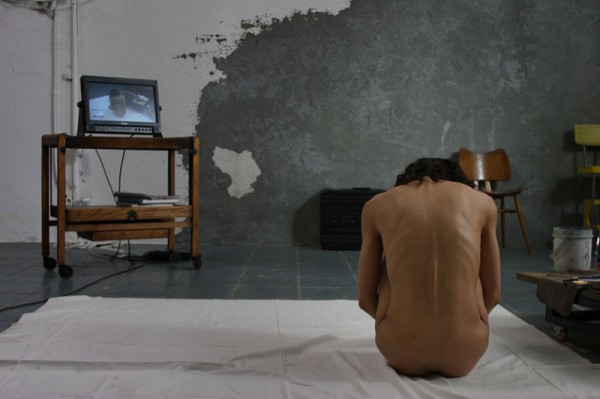

 The excellent Japan Society series “Love Will Tear Us Apart,” which consists of Japanese and Korean films dealing with erotic obsession, continues on March 10 with three works by Korean auteur Kim Ki-duk, beginning at 3:00 with Time. After two years together, See-hee (Seong Hyeon-ah) thinks that her boyfriend, Ji-woo (Ha Jung-woo), has lost interest in her. She goes crazy jealous whenever he even so much as takes a peek at another woman, embarrassing him in public time and time again. But when she suddenly disappears, he soon realizes that he can’t live without her. And he won’t necessarily have to; See-hee has taken off to have a plastic surgeon (Kim Sung-min) completely change her face so she can make Ji-woo fall in love with her (now played by Park Ji-yun) all over again, even if he doesn’t know who she really is. But it is a lot harder to change one’s inner psyche than outward physical appearance. Kim, who has made such unusual and compelling films as 3-Iron, The Bow, and Spring, Summer, Fall, Winter . . . and Spring, has crafted yet another fascinating drama that challenges the audience with its unique and unexpected twists and turns, asking intriguing questions rather than doling out simplistic answers. Kim shows the passage of time as a natural enemy to love and romance — but one that can be overcome. “Time travels in divers paces with divers persons,” Shakespeare wrote in As You Like It. And so it does in this difficult yet memorable film.
The excellent Japan Society series “Love Will Tear Us Apart,” which consists of Japanese and Korean films dealing with erotic obsession, continues on March 10 with three works by Korean auteur Kim Ki-duk, beginning at 3:00 with Time. After two years together, See-hee (Seong Hyeon-ah) thinks that her boyfriend, Ji-woo (Ha Jung-woo), has lost interest in her. She goes crazy jealous whenever he even so much as takes a peek at another woman, embarrassing him in public time and time again. But when she suddenly disappears, he soon realizes that he can’t live without her. And he won’t necessarily have to; See-hee has taken off to have a plastic surgeon (Kim Sung-min) completely change her face so she can make Ji-woo fall in love with her (now played by Park Ji-yun) all over again, even if he doesn’t know who she really is. But it is a lot harder to change one’s inner psyche than outward physical appearance. Kim, who has made such unusual and compelling films as 3-Iron, The Bow, and Spring, Summer, Fall, Winter . . . and Spring, has crafted yet another fascinating drama that challenges the audience with its unique and unexpected twists and turns, asking intriguing questions rather than doling out simplistic answers. Kim shows the passage of time as a natural enemy to love and romance — but one that can be overcome. “Time travels in divers paces with divers persons,” Shakespeare wrote in As You Like It. And so it does in this difficult yet memorable film.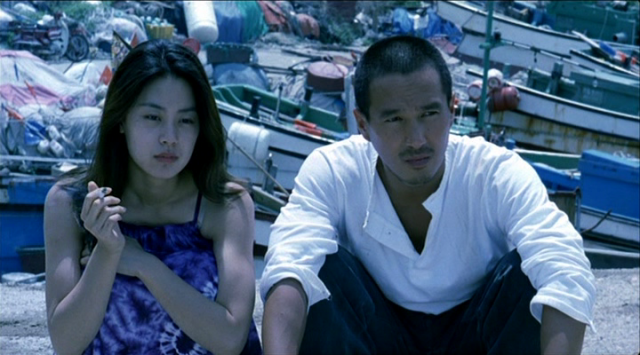
 Kim Ki-duk has made a number of excellent films, but Bad Guy is not one of them. Instead, it’s a preposterous, painfully puerile, and deeply misogynistic movie that is insulting from start to finish. Although it’s only a hundred minutes long, it feels like a thousand. Won Seo stars as Sun-hwa, a college girl who gets conned by Han-ki (Cho Je-hyun) into becoming a prostitute to pay off a false debt. He watches her transformation through a two-way mirror while one of his henchmen, Myung-soo (Choi Duk-moon), thinks he has fallen in love with her himself. Lots of sex and violence ensue, most of which makes no sense and is as unbelievable as the premise. The evening concludes at 7:30 with Kim’s 2008 Dream, a tale in which two people’s dreams intersect.
Kim Ki-duk has made a number of excellent films, but Bad Guy is not one of them. Instead, it’s a preposterous, painfully puerile, and deeply misogynistic movie that is insulting from start to finish. Although it’s only a hundred minutes long, it feels like a thousand. Won Seo stars as Sun-hwa, a college girl who gets conned by Han-ki (Cho Je-hyun) into becoming a prostitute to pay off a false debt. He watches her transformation through a two-way mirror while one of his henchmen, Myung-soo (Choi Duk-moon), thinks he has fallen in love with her himself. Lots of sex and violence ensue, most of which makes no sense and is as unbelievable as the premise. The evening concludes at 7:30 with Kim’s 2008 Dream, a tale in which two people’s dreams intersect.
